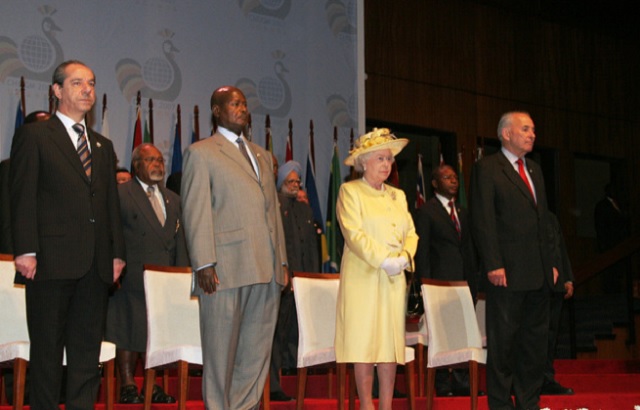
Today the Commonwealth exists as an organisation in search of a rationale
Kampala, Uganda | MICHAEL WESLEY | Anyone interested in power must visit Persepolis. Its ruins stand defiantly in a parched valley in southern Iran, the ultimate statement of the capacity of humans to dominate vast multitudes of their fellow humans.
Amid the intricately carved stairways, walls and plinths stand the two halls from which the Achaemenid Empire radiated its power, from the Indus to the Danube. The Apadana, begun by Darius in 518 BC and finished by Xerxes, was where the King of Kings received tribute from the variety of peoples he ruled.
With walls 60 metres long, its huge ceiling of Lebanese cedar was supported on 72 columns of carved grey marble, each 19 metres high. Next to the Apadana is the even larger Throne Hall, its massive roof once supported by 100 columns, each of its eight carved stone doorways depicting the King of Kings wrestling with a mythical monster.
The architecture of these two halls, and the stairways leading to them, was designed to inspire awe in the subjects of the Achaemenids. Any tributary hoping to see the King of Kings would be so disoriented by the time he saw the throne as to be utterly prostrate at the heart of the largest empire the world had ever seen.
The British Empire has no Persepolis. Its beginning and end weren’t marked by the construction and destruction of a city. London began as an outpost of another empire, and has continued to flourish long after the fall of its own.
Neither is there a founding date or a battle in which Britain decisively beat its predecessor and was universally hailed as the new world power just as there is no decisive defeat that marks its end.
The British Empire is a story of ambitious, evangelical, avaricious but ordinary men and women, and a weary, reluctant Whitehall bureaucracy dragged toward formalising what its citizens had created on the frontiers of enterprise in Asia, Africa and the Pacific.
Far from popular notions of an empire driven by surging jingoistic ambition, British society was deeply divided about the benefits and morality of empire at the time of its greatest expansion.
By the mid-19th century, a rising tide of opinion opposed to imperialism on material and moral grounds had begun to contest the pro-imperialist dominance of the Tories under Palmerston and Disraeli. Britain’s economy had started to sputter and lose ground to surging industrial rivals; accumulated war debt and rising taxes were generating popular resentment.
William Ewart Gladstone, at the head of a surging Liberal movement, combined moral attacks on the Tories’ overseas adventurism with a hip-pocket campaign that debt and taxes were the direct consequence of imperial ambition.
And yet, the 70 years that followed 1850 saw the fastest expansion of the empire in history. Hundreds of millions of Asians, Africans, Pacific Islanders and Americans found themselves ruled by Britannia. Apart from in India, the British preferred to govern through local systems of government and, more often than not, reluctantly.
As the French and the Germans became determined to build themselves global empires, the British were forced to clarify their intentions in vast areas of the world where they had simply asserted a sphere of influence by virtue of the British navy and British commercial dominance.
Repeatedly, where they had been prepared to stand aside in a bid to manage complex relations with their continental rivals, the British found their hand forced by the thrusting subjects in their dominions, who had none of the Empire-weariness of British society.
After the First World War, a bloodied and impoverished Britain found itself forced to take on yet more territory surrendered by vanquished empires in the Middle East and Africa.
Just as the British Empire has no founding moment, neither has it an emphatic final act. There is no burning of Persepolis from which history will forever date the demise of Rule Britannia. After the Second World War, the largest empire the world has ever seen declined exactly as it had arisen – through the self-interested acts of thousands of subjects, overseen by an overwhelmed Whitehall bureaucracy, amid an ambivalent British public, romantic and cynical at the same time.
Even today, Britain can’t divest itself of territories that cause it diplomatic difficulties the Falklands, Gibraltar, Northern Ireland – thanks to the attachment of their populations to membership of a vanished empire.
And while the British Empire’s gracious decline can be seen as a tribute to the prim pragmatism of the same national character that built it, the lack of a final act may carry an ominous thread. Without a clear full stop there can be no certainty that the unraveling has ended even now.
The evolution of the Commonwealth
The key to Britannia’s reluctant rise and dignified eclipse lies in a mystical association: the Commonwealth.
The displacement of “empire” by “Commonwealth” first happened amid the horror of the First World War, at the Imperial War Conference of 1917. Britain, its self-governing dominions Canada, Australia, New Zealand, South Africa and Newfoundland – and India had come together to discuss the form and function of the empire after the war.
 The Independent Uganda: You get the Truth we Pay the Price
The Independent Uganda: You get the Truth we Pay the Price


